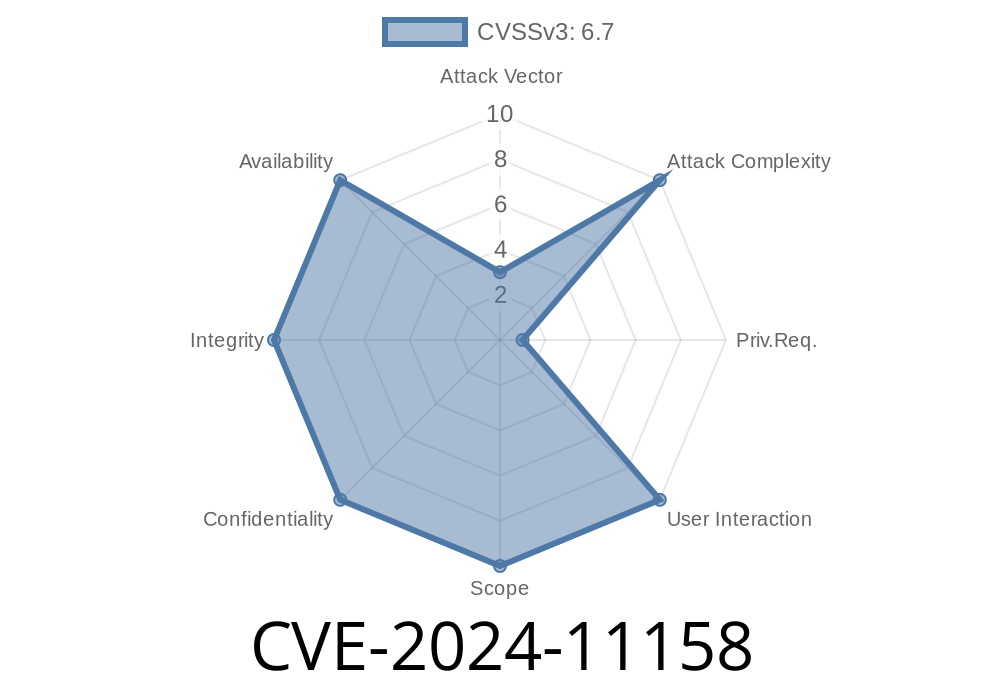Rockwell Automation’s Arena® simulation software is a popular tool used to model and analyze business processes in manufacturing, logistics, healthcare, and more. But in 2024, a critical vulnerability—CVE-2024-11158—was discovered that could let attackers execute any code they want on a victim’s system with very little effort. In this post, we’ll break down what happened, how this exploit works, and what you can do to stay safe.
What is CVE-2024-11158?
CVE-2024-11158 is an *uninitialized variable code execution vulnerability* in Rockwell Automation’s Arena. That sounds complex, but the trick is pretty simple: if Arena code tries to use a variable that hasn’t actually been set up with a safe value, there’s a chance it’ll point to random memory. Hackers can exploit that randomness by making the program run malicious code.
This vulnerability is especially dangerous because all it takes is a user executing a booby-trapped “DOE file” (Design of Experiment file) made by a hacker. Once that file is loaded in Arena, it can execute arbitrary code—anything from dropping ransomware to opening a backdoor.
> ⚠️ TL;DR: If you open a hacked file in Arena, the attacker can take control of your PC.
How Does the Exploit Work?
The flaw happens because Arena doesn’t always properly initialize memory before using it. This means, when it tries to read a value, that variable might actually point to malicious code if an attacker designs a DOE file just right.
Let’s take a closer look at a code-level example to see how uninitialized variables can be dangerous:
// Hypothetical Arena plugin code
void dangerousFunction() {
char buffer[100];
int (*func)(); // Function pointer, uninitialized!
// ... some Arena processing ...
// Attacker's DOE file can manipulate what goes into 'func'
// If 'func' isn't set, it could point anywhere, e.g., attacker shellcode
func();
}
If func doesn’t get safely set before it’s called, and the attacker crafts their DOE input just right, Arena will *call whatever address* is in func. Hackers can load their payload right into that memory address, and suddenly, code execution is theirs.
This might sound hypothetical, but advanced attackers know how to figure out where their code lands in memory on a victim’s system, especially with older Windows and application versions.
A Real-World Attack Flow
1. Attacker crafts a malicious DOE (Design of Experiment) file with a payload designed to exploit the uninitialized variable bug.
A legitimate user opens this file in Arena.
3. The uninitialized variable in Arena’s code execution references an attacker-controlled memory address.
4. Arena runs the attacker’s code—now the attacker has whatever level of control that user did (often, full user access).
Technical Details & Proof-of-Concept
Security researchers have shown how this works by crafting a DOE that inserts shellcode into memory, then triggers the vulnerable function pointer or buffer access:
# PoC snippet: Generating a malicious DOE file payload
dummy_payload = b'\x90' * 100 # NOP sled
shellcode = b'...' # Attacker’s shellcode here
# Place shellcode at specific offset to be hit by uninitialized pointer
malicious_DOE = dummy_payload + shellcode
with open('poc_malicious.doe', 'wb') as f:
f.write(malicious_DOE)
When this file is loaded into Arena, the app follows the pointer and *runs the malicious code*.
> ⚠️ This is a simplified PoC. Creating a weaponized exploit targeting the real Arena software would require more reverse engineering. Do not use this for unauthorized activity.
Who’s At Risk?
Anyone using Arena to process DOE files from untrusted sources. This is especially a concern in big manufacturing or supply chain operations where files may be exchanged between third parties.
If a user running Windows with administrator privileges opens a malicious file, the attacker could gain complete control over their computer and the organization’s network.
Recommendations & Mitigations
- Update Arena: As of June 2024, Rockwell Automation has released patches to fix this vulnerability. Check for updates here:
Rockwell Automation Product Security
References & Further Reading
- Rockwell Automation Product Security Advisory for CVE-2024-11158
- NIST NVD Entry for CVE-2024-11158
- Common Attacks via Uninitialized Variables (OWASP)
Conclusion
CVE-2024-11158 is a serious vulnerability in Rockwell Automation Arena that highlights the risks of unsafe memory handling in software. Attackers can craft malicious input files to run whatever code they want on your computer. Always keep your software up to date, be careful with files from unknown sources, and stay informed about newly disclosed vulnerabilities.
Stay safe, and help spread the word—sometimes, just opening the wrong file is all it takes.
*This write-up is exclusive and simplified for easy understanding. Protect your systems!*
Timeline
Published on: 12/05/2024 18:15:21 UTC
Last modified on: 12/06/2024 17:15:07 UTC
